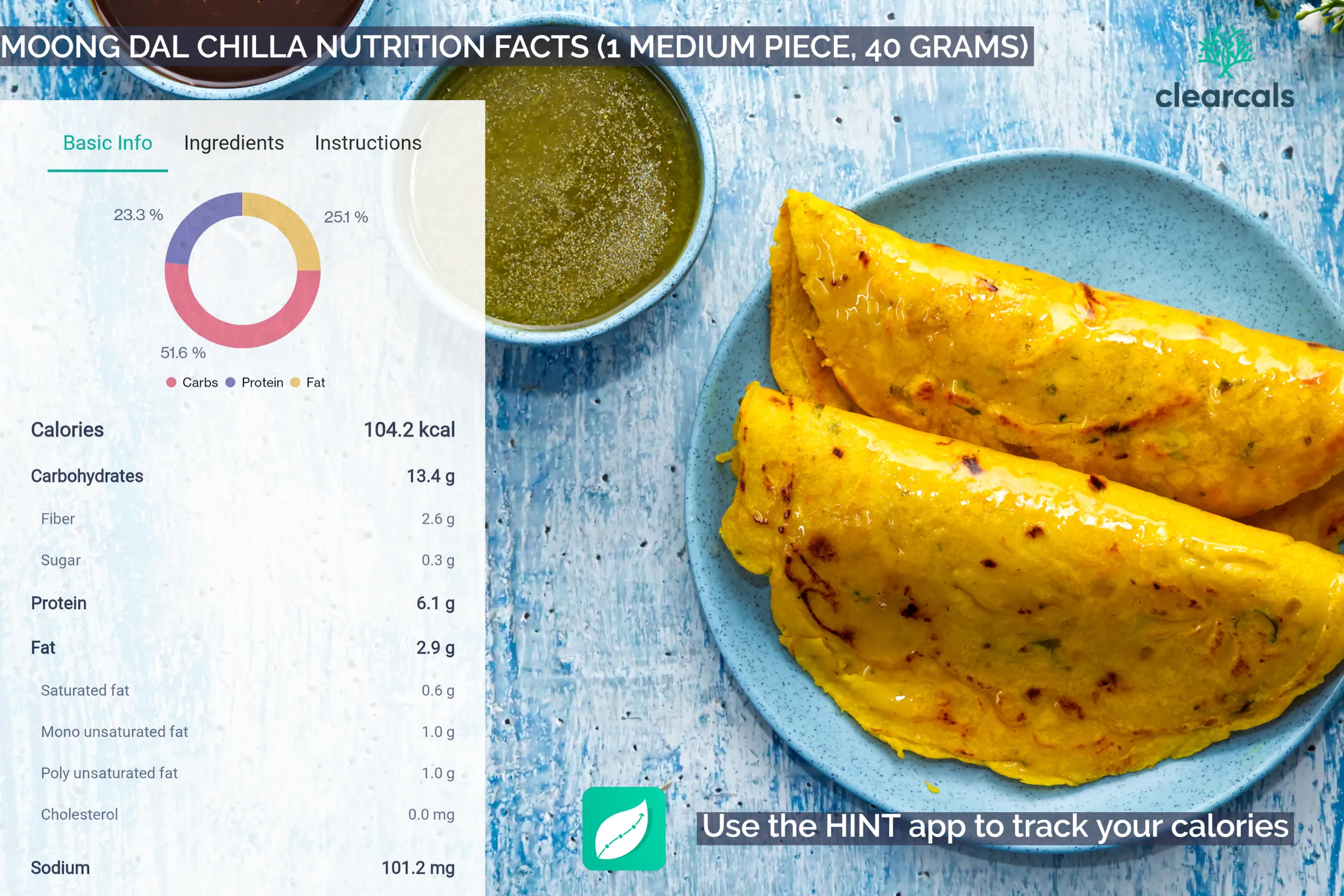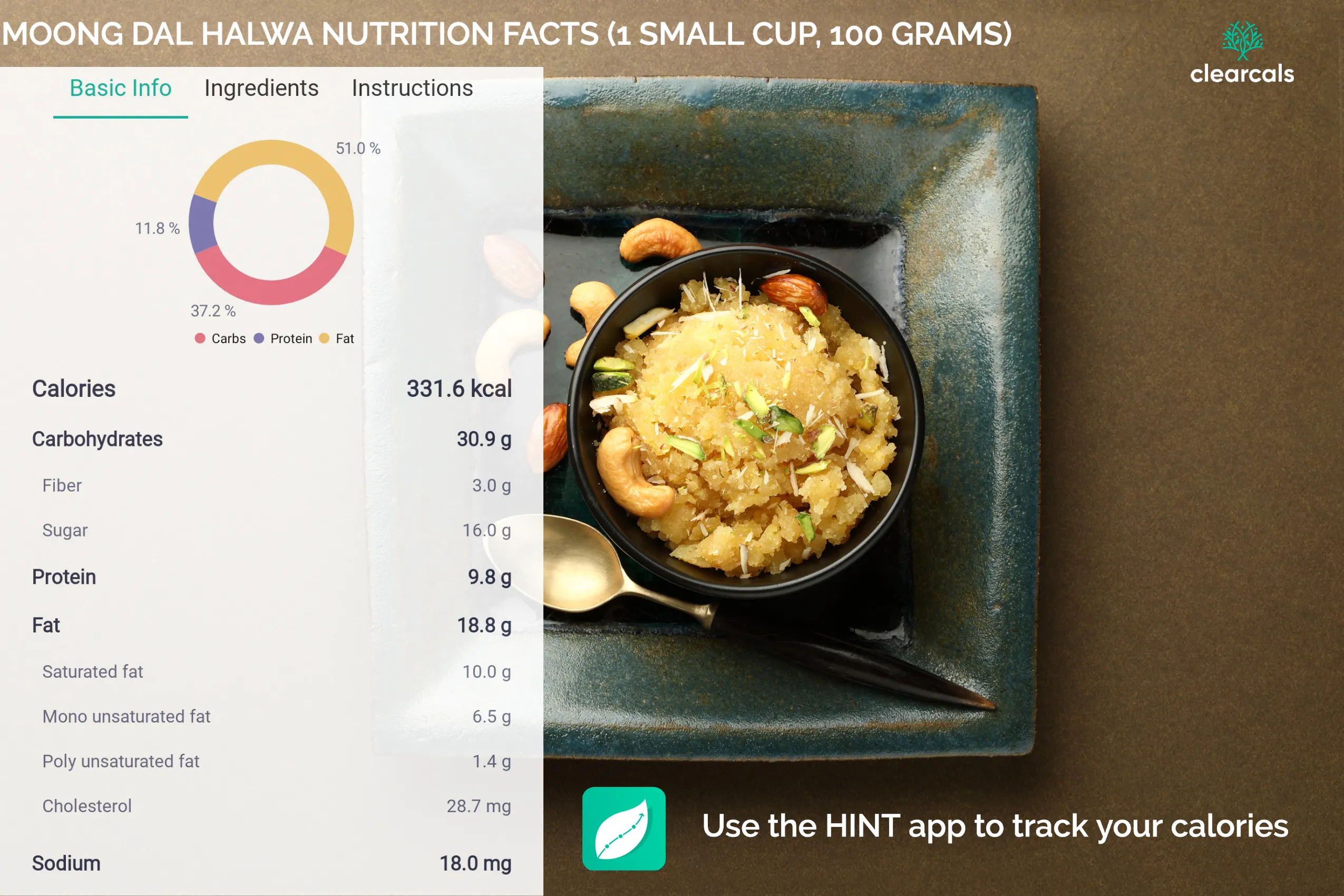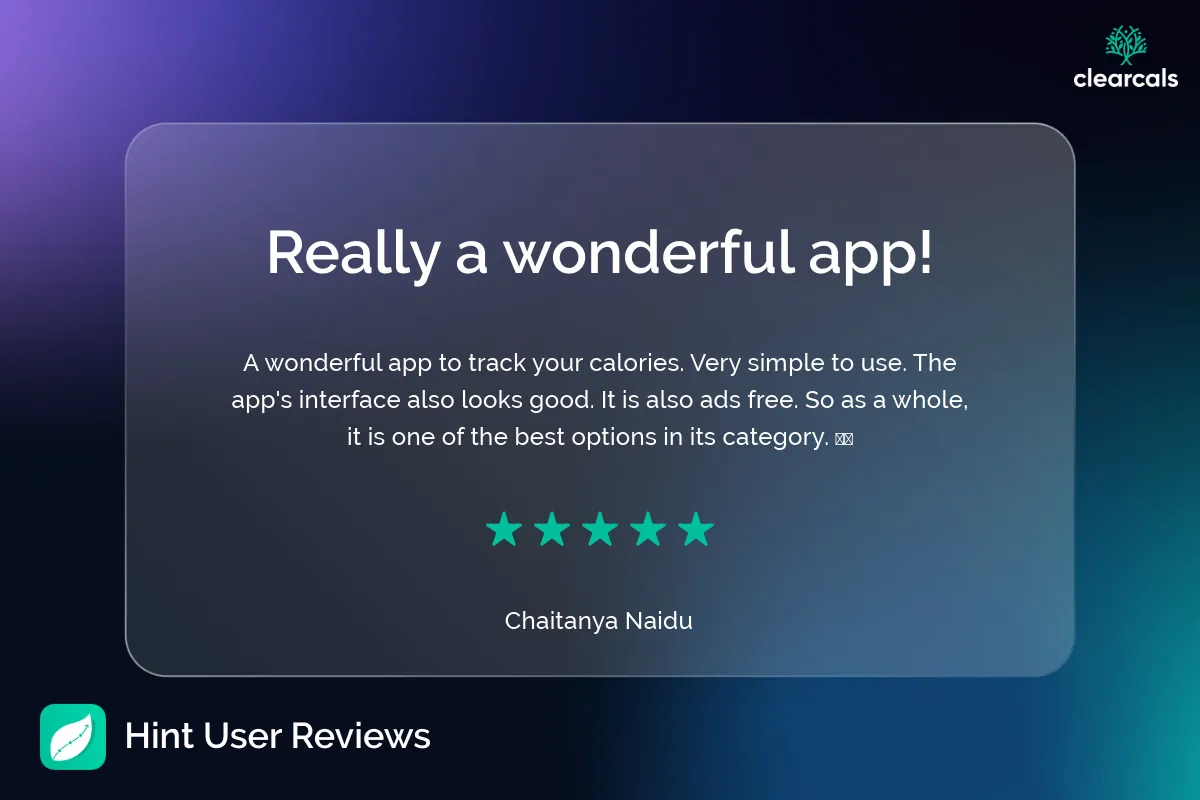Looking for a Personalized Diet Plan?
Moong Dal Calories, Nutrition, and Health Benefits

TLDR
- One small cup of Moong dal has 97 kcal.
- Calories in moong dal depend on the serving size and recipe.
- Moong dal is a rich source of protein, dietary fiber, and essential nutrients.
- Regular consumption can help reduce the risk of diabetes, hypertension, and PCOS.
How Many Calories Are In One Cup of Moong Dal?
One small cup (100 grams) of moong dal tadka has 97 kcal. The calorie content depends on the serving size and the specific recipe used. Here’s a breakdown of calories by serving size:
| Moong Dal Serving Size (in grams) | Calories in Moong Dal (kcal) |
|---|---|
| 1 Small cup (100 grams) | 97 |
| 1 Medium cup (200 grams) | 193 |
| 1 Large cup (300 grams) | 290 |
Moong Dal Nutritional Value per 100g
In 100 grams, moong dal provides a well-rounded mix of nutrients, with 47% carbohydrates, 20% protein, and 33% fat. Here’s a closer look at the nutritional breakdown:
| Nutrient | Amount per 100 grams |
|---|---|
| Protein | 4.8 grams |
| Carbohydrates | 11.4 grams |
| Dietary Fiber | 4.0 grams |
| Fat | 3.6 grams |
| Potassium | 372 mg |
| Magnesium | 49 mg |
| Copper | 0.2 mg |
| Selenium | 8 mcg |
| Manganese | 0.6 mg |
| Beta-Carotene | 1600 mcg |
| Lutein | 2322 mcg |
It is a good source of protein, dietary fiber, potassium, magnesium, copper, selenium, manganese, and an excellent source of beta-carotene, and lutein. It helps boost immunity and strengthen muscles.
Moong Dal Protein Per 100g
Moong dal is a great source of plant-based protein, providing approximately 4.8g of protein per 100g. This makes it a valuable addition to vegetarian and vegan diets, especially for those aiming to increase protein intake.
Download the Hint app to track the number of calories consumed from Moong dal recipes for various types of Moong dal.
Is Moong Dal Good for Health?
Absolutely! Moong dal is a powerhouse of nutrients, offering various health benefits from improving heart health and blood pressure to supporting immunity and muscle function.
Moong Dal Benefits
Moong dal offers several health benefits, thanks to its high nutritional value. Here are some of the top benefits:
- Supports Weight Loss: Moong dal’s fiber and protein help promote satiety, reducing overall calorie intake and aiding weight management.
- Helps Control Blood Sugar: The low glycemic index of moong dal makes it ideal for individuals with diabetes, as it helps regulate blood sugar levels.
- Boosts Immunity: Packed with antioxidants like selenium and zinc, moong dal supports immune health.
- Improves Heart Health: Its potassium and magnesium content can aid in maintaining healthy blood pressure levels.
Is Moong Dal Good for Weight Loss?
Moong dal is a good source of dietary fiber and protein. It is loaded with various types of vitamins and minerals. Eating Moong dal daily as part of lunch or dinner while controlling your daily calories significantly helps in weight loss1.
To learn more, read our blogs on counting your calories for weight loss.
Is Moong Dal Good for Diabetes?
Numerous studies suggest that including moong dal in your diet over long periods significantly lowers your fasting glucose, glycated hemoglobin (HbA1c), and homeostatic model assessment of insulin resistance (HOMA-IR)2. In other words, eating moong dal daily is good for controlling blood sugar levels and reducing insulin resistance.
If you are diabetic, you can subscribe to the Indian diabetic diet instant plan for a balanced diet with different varieties of moong dal recipes and control your blood glucose levels.
Moong Dal Glycemic Index
The glycemic index of moong dal is relatively low, making it a good food choice for people with diabetes or those watching their blood sugar levels. It provides steady energy without causing rapid blood sugar spikes.
Is Moong Dal Good for Blood Pressure?
Research suggests eating moong dal and other pulses daily causes a significant reduction in systolic blood pressure3. The blood pressure-lowering effects of moong dal could be due to various components such as phytochemicals, dietary fiber, potassium, and magnesium.
Is Moong Dal Good for PCOS?
A 2018 study conducted on women with PCOS demonstrated that following a diet with dals and pulses is effective in improving insulin response to an Oral Glucose Tolerance Test (OGTT), levels of triglycerides, LDL-cholesterol, HDL-cholesterol, and diastolic blood pressure.
To put it clearly, eating yellow or green moong dal and other pulses daily can prevent complications in women with PCOS. To learn more about the PCOS diet and treatment, read our blog.
Is Moong Dal Good for the Thyroid?
Moong dal is a good source of selenium, zinc, and iodine. Eating such selenium-rich food prevents selenium deficiency and helps improve thyroid function. We recommend that patients suffering from hypothyroidism eat moong dal along with healthy fats and other protein-rich foods.
Our clinical dietitians are experts in the management of thyroid disorders. Here is the story of how we helped Priyanka follow a healthy lifestyle and get rid of her thyroid medication.
Is Moong Dal Good for Immunity?
Moong dal is a good source of dietary fiber. Eating high-fiber food improves gut health and is critical for proper immune function. Apart from fiber, it is also a good source of selenium and zinc, which help boost immunity. Sprouting increases the vitamin C content. Therefore one can include moong sprouts to improve their immunity.
To know more about which nutrients effectively boost immunity, read our blog on supporting your immunity through nutrition.
Is Moong Dal Good for Muscle Gain?
Moong dal contains high protein and dietary fiber. If consumed with regular physical activity and other high-protein foods, it could contribute to muscle gain. To improve muscle gain, include protein-rich foods in your diet. Download the HINT app and go to the recipe section to check for high-protein recipes.
Is Moong Dal Good for Weight Gain?
Moong dal is a good source of protein and essential amino acids,s which could directly contribute to healthy weight gain.
For more protein-rich food that could be consumed along with Moong dal, you can check the recipes section of the HINT app.
Is Moong Dal Good for Fat Loss?
Recent studies report that including moong dal and other pulses in your daily diet results in fat loss.1-3
For better results, along with changing your diet by including Moong dal use the Hint app and track your lifestyle.
Moong Dal Side Effects
While moong dal is highly nutritious, some individuals may experience bloating or gas, especially if eaten in large amounts. Soaking or sprouting moong dal can reduce these effects and improve digestibility.
Moong Dal Recipes
Here are the calorie values of various types of moong dal recipes including snacks, desserts, curries, khichdi, and soups. Download the Hint app for more information on moong dal recipes, calories, and nutrition facts.
| Moong Dal Recipes - Snacks | Calories (kcal) in 1 Small Piece (30 grams) |
|---|---|
| Sprouted moong methi cheela | 35 |
| Green moong dal and vegetable idli | 44 |
| Moong dal and palak idli | 46 |
| Lauki moong dal cheela | 47 |
| Rice and moong dal idli | 53 |
| Moong dal palak cheela | 56 |
| Moong sprout kebab | 65 |
| Moong dal dhokla | 72 |
| Yellow moong pesarattu | 75 |
| Moong dal cheela | 78 |
| Oats and moong dal vada | 86 |
| Yellow moong dal paratha | 108 |
| Moong dal ladoo | 132 |
| Moong Dal Recipes - Snacks | Calories (kcal) in 1 Small Cup (100 grams) |
|---|---|
| Moong sprouts salad | 28 |
| Moong spring onion tomato salad | 28 |
| Moong sprouts corn salad | 35 |
| Moong sprouts stir fry | 110 |
| Carrot moong dal stir fry | 115 |
| Moong dal halwa | 332 |
| Haldiram's moong dal | 465 |
| Moong Dal Recipes - Curries | Calories (kcal) in 1 Small Cup (100 grams) |
|---|---|
| Pumpkin moong dal curry | 95 |
| Ridge gourd moong dal curry | 106 |
| Bottle gourd moong dal curry | 108 |
| Moong dal kosambari | 109 |
| Spring onion moong dal curry | 109 |
| Cabbage moong dal curry | 113 |
| Palak paneer with moong dal curry | 126 |
| Moong dal usili | 129 |
| Bachalikura (basella leaves) moong dal curry | 134 |
| Plantain moong dal curry | 164 |
| Moong dal curry | 167 |
| Moong Dal Recipes - Khichdi and Soups | Calories (kcal) in 1 Medium Cup (200 grams) |
|---|---|
| Thotakura pulusu (amaranth moong dal stew) | 160 |
| Moong dal vegetable soup | 167 |
| Yellow moong dal soup | 193 |
| Sabudana moong khichdi | 184 |
| Spinach moong dal khichdi | 213 |
| Bajra moong dal khichdi | 257 |
| Moong dal khichdi | 259 |
| Rice moong dal pongal | 285 |
| Brown rice moong dal pongal | 304 |
Top 5 Popular Moong Dal Recipes
There are many healthy and tasty varieties of moong dal. Listed below are the top 5 popular moong dal recipes with related calorie and nutrition information.

1. Moong Dal Chilla Calories
One small piece (30 grams) of moong dal chilla or cheela has 78 kcal. 52% of these calories are from carbohydrates, 23% from protein, and 25% from fat.
Moong Dal Chilla Benefits
Moong dal chilla is a good source of protein, magnesium, phosphorus, and an excellent source of selenium. Eating moong dal chilla helps in lowering blood pressure and reduces muscle cramps.
Moong dal chilla, a popular snack, is packed with protein, fiber, and essential nutrients. It’s great for muscle health, aids in digestion, and helps in managing blood pressure, thanks to its high magnesium and potassium content.
Calories in moong dal chilla depend on their serving size or quantity in grams and recipe. Here is a table of how calories increase with serving size and the number of chillas.
| Serving Size (in grams) | 1 Moong dal chilla calories (kcal) | 2 Moong dal chilla calories (kcal) | 3 Moong dal chilla calories (kcal) | 4 Moong dal chilla calories (kcal) |
|---|---|---|---|---|
| 1 Small piece (30 grams) | 78 | 156 | 234 | 312 |
| 1 Medium piece (40 grams) | 104 | 208 | 313 | 417 |
| 1 Large piece (50 grams) | 130 | 260 | 391 | 521 |

2. Moong Dal Khichdi Calories
One medium cup (200 grams) of moong dal khichdi has 259 kcal. 66% of these calories are from carbohydrates, 12% from protein, and 22% from fat.
Moong dal khichdi is a good source of dietary fiber, protein, thiamin, vitamin B5, phosphorus, copper, manganese, and an excellent source of selenium. Eating moong dal khichdi helps manage diabetes and improve thyroid function.
Calories in moong dal khichdi depend on its serving size or quantity in grams and recipe. Here is a table of how calories increase with the serving size of moong dal khichdi.
| Serving Size (in grams) | Moong Dal Khichdi Calories (kcal) |
|---|---|
| 1 Small cup (100 grams) | 129 |
| 1 Medium cup (200 grams) | 259 |
| 1 Large cup (300 grams) | 388 |

3. Moong Dal Dosa Calories
Moong dal dosa is also known as pesarattu. One small piece (30 grams) of moong dal dosa has 75 kcal. 64% of these calories are from carbohydrates, 21% from protein, and 14% from fat.
Moong dal dosa is an excellent source of protein, dietary fiber, magnesium, copper, and selenium. Eating moong dal dosa helps strengthen muscles and improve thyroid function.
Calories in moong dal dosa depend on their serving size or quantity in grams and recipe. Here is a table of how calories increase with serving size and the number of dosas.
| Serving Size (in grams) | 1 Moong dal dosa calories (kcal) | 2 Moong dal dosa calories (kcal) | 3 Moong dal dosa calories (kcal) | 4 Moong dal dosa calories (kcal) |
|---|---|---|---|---|
| 1 Small piece (30 grams) | 75 | 150 | 226 | 301 |
| 1 Medium piece (40 grams) | 100 | 201 | 301 | 401 |
| 1 Large piece (50 grams) | 125 | 251 | 376 | 502 |

4. Moong Dal Sprouts Calories
One small cup (100 grams) of moong sprouts salad has 28 kcal. 69% of these calories are from carbohydrates, 21% from protein, and 10% from fat.
Moong dal sprouts salad is a good source of vitamin C, and an excellent source of alpha-carotene, and beta-carotene. Eating moong dal sprouts salad helps strengthen muscles and boost immunity.
Calories in moong dal sprouts depend on its serving size or quantity in grams and recipe. Here is a table of how calories increase with the serving size of moong dal sprouts.
| Serving Size (in grams) | Moong Dal Sprouts Calories (kcal) |
|---|---|
| 1 Small cup (100 grams) | 27 |
| 1 Medium cup (200 grams) | 55 |
| 1 Large cup (300 grams) | 83 |

5. Moong Dal Halwa Calories
One small cup (100 grams) of moong dal halwa has 332 kcal. 37% of these calories are from carbohydrates, 12% from protein, and 51% from fat.
Moong dal halwa is a good source of protein, dietary fiber, calcium, vitamin D, magnesium, manganese, thiamin, pantothenic acid, biotin, vitamin E, and an excellent source of copper, phosphorus, and selenium. Eat moong dal halwa in moderation as it contains high sugar and saturated fat.
Calories in moong dal halwa depend on its serving size or quantity in grams and recipe. Here is a table of how calories increase with the serving size of moong dal halwa.
| Serving Size (in grams) | Moong Dal Halwa Calories (kcal) |
|---|---|
| 1 Small cup (100 grams) | 332 |
| 1 Medium cup (200 grams) | 663 |
| 1 Large cup (300 grams) | 995 |

Enhance Your Diet with the Hint App
For those following a high-protein diet plan, moong dal is a fantastic addition. The Hint app makes it easy to track your calorie intake from various moong dal recipes, allowing you to stay on top of your health goals.
With the free protein intake tracking feature, you can monitor your daily protein intake and ensure you’re meeting your nutritional needs.
For users looking to maximize their fitness journey, Pro Workouts are available with Hint Pro or Hint Premium, offering 300+ strength-training routines, calorie tracking, and exercise guides.
With Hint Premium, users also get unlimited dietitian consultations and personalized diet plans tailored to their health goals, including options for diabetes management, PCOS support, and more.
Conclusion
Moong dal is a nutritious and versatile ingredient with a wealth of health benefits, from promoting weight loss and managing diabetes to supporting immunity and muscle gain. Whether enjoyed as a hearty khichdi, a crispy chilla, or fresh sprouts, moong dal is a valuable addition to any diet.
With the Hint app, tracking your calorie and protein intake has never been easier.
Whether you’re aiming to lose weight, manage diabetes, or simply add more plant-based protein to your meals, Hint Pro and Hint Premium can support you every step of the way.
Download the app and start your journey to better health with delicious, nutrient-rich moong dal recipes.
Exclusive Offer: Enjoy One Month of Free Hint Premium Access
When you purchase any of the following from the Clearcals Store: Garmin Venu Sq 2, Garmin Vivoactive 5, Garmin Instinct 2, Instinct 2X Solar, or Instinct 2X Solar Tactical, you'll receive one month of free Hint Premium (worth Rs. 1999), which includes:
✅ Unlimited dietitian consultations
✅ Personalized diet and workout plans
✅ Advanced calorie and nutrition tracking
🚀 Visit the Clearcals Store today and unlock your free Hint Premium access!
References
- Kim SJ, de Souza RJ, Choo VL, Ha V, Cozma AI, Chiavaroli L, Mirrahimi A, Blanco Mejia S, Di Buono M, Bernstein AM, Leiter LA, Kris-Etherton PM, Vuksan V, Beyene J, KenMoong dall CW, Jenkins DJ, Sievenpiper JL. Effects of dietary pulse consumption on body weight: a systematic review and meta-analysis of randomized controlled trials. Am J Clin Nutr. 2016 May;103(5):1213-23. doi: 10.3945/ajcn.115.124677. Epub 2016 Mar 30. PMID: 27030531.
- Hafiz MS, Campbell MD, O'Mahoney LL, Holmes M, Orfila C, Boesch C. Pulse consumption improves indices of glycemic control in adults with and without type 2 diabetes: a systematic review and meta-analysis of acute and long-term randomized controlled trials. Eur J Nutr. 2022 Mar;61(2):809-824. doi: 10.1007/s00394-021-02685-y. Epub 2021 Sep 29. PMID: 34585281; PMCID: PMC8854292.
- Lukus PK, Doma KM, Duncan AM. The Role of Pulses in Cardiovascular Disease Risk for Adults With Diabetes. Am J Lifestyle Med. 2020 May 25;14(6):571-584. doi: 10.1177/1559827620916698. PMID: 33117097; PMCID: PMC7566181.






